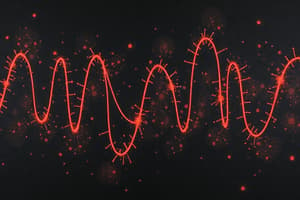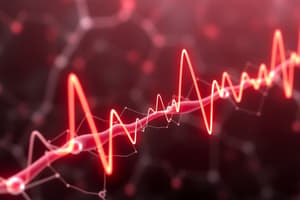Podcast
Questions and Answers
What is the relationship between action potentials and graded potentials?
What is the relationship between action potentials and graded potentials?
- Every graded potential causes an action potential
- An action potential is the sum of several graded potentials
- Action potentials are initiated when the membrane is depolarised to threshold by a graded potential (correct)
- Two terms describing the same event
Why do voltage regulated K+ channels not need to inactivate?
Why do voltage regulated K+ channels not need to inactivate?
- Because they are always open
- Because the equilibrium potential for K+ is higher than the threshold of the K+ channels (ca -60 mV)
- Because they are blocked by Na+ ions
- Because the equilibrium potential for K+ is lower than the threshold of the K+ channels (ca -60 mV) (correct)
Which feature of voltage-regulated ion channels is responsible for a neuron’s refractory period?
Which feature of voltage-regulated ion channels is responsible for a neuron’s refractory period?
- K+ channel activation
- Na+ channel threshold
- K+ channel inactivation
- Na+ channel inactivation (correct)
What is the correct sequence of events during an action potential?
What is the correct sequence of events during an action potential?
Why can an action potential not be initiated during the refractory period?
Why can an action potential not be initiated during the refractory period?
Why does continuous propagation of the action potential not occur in myelinated axons?
Why does continuous propagation of the action potential not occur in myelinated axons?
Why do action potentials travel long distances while graded potentials do not?
Why do action potentials travel long distances while graded potentials do not?
What determines the duration of an action potential?
What determines the duration of an action potential?
Which of the following CANNOT initiate a graded potential?
Which of the following CANNOT initiate a graded potential?
Pick the correct statement. At a chemical synapse:
Pick the correct statement. At a chemical synapse:
What terminates transmission at the cholinergic synapse?
What terminates transmission at the cholinergic synapse?
Pick the correct statement. Slow postsynaptic receptors:
Pick the correct statement. Slow postsynaptic receptors:
What function of neurons is performed by summation?
What function of neurons is performed by summation?
Why do alkalosis and acidosis affect neural impulse conduction?
Why do alkalosis and acidosis affect neural impulse conduction?
Atropine binds to muscarinic acetylcholine receptors and prevents their activation by acetylcholine. This means it acts as an:
Atropine binds to muscarinic acetylcholine receptors and prevents their activation by acetylcholine. This means it acts as an:
Selective serotonin reuptake inhibitors (SSRIs, Prozac) prolong the action of serotonin (5HT) at a synapse by preventing its removal from the synaptic cleft. This means they act as:
Selective serotonin reuptake inhibitors (SSRIs, Prozac) prolong the action of serotonin (5HT) at a synapse by preventing its removal from the synaptic cleft. This means they act as:
Parkinson's disease is caused by deficient dopamine pathways in the brain. It is therefore best treated with:
Parkinson's disease is caused by deficient dopamine pathways in the brain. It is therefore best treated with:
The tendon-stretch reflex can be classified as a:
The tendon-stretch reflex can be classified as a:
Damage to which area of the brain would be expected to impair control of food intake?
Damage to which area of the brain would be expected to impair control of food intake?
Which of the following is part of the 'rest-and-repose' response?
Which of the following is part of the 'rest-and-repose' response?
Flashcards are hidden until you start studying
Study Notes
Action Potentials & Graded Potentials
- Action potentials are triggered when the membrane is depolarized to threshold by a graded potential.
- Graded potentials are localized changes in membrane potential that can vary in size.
- Action potentials are rapid, large depolarizations that are propagated along the axon.
Voltage-Regulated K+ Channels
- K+ channels do not need to inactivate because the equilibrium potential for K+ is lower than the threshold of the K+ channels (ca -60 mV).
- This lower potential means that K+ ions flow out of the cell when the membrane is depolarized, repolarizing the membrane.
Refractory Periods in Neurons
- The inactivation of voltage-gated Na+ channels is responsible for the refractory period of a neuron.
- During the refractory period, it is difficult or impossible to generate another action potential.
Sequence of Events During an Action Potential
- The correct sequence of events is:
- Graded depolarization to threshold
- Activation of voltage-gated Na+ channels
- Inactivation of voltage-gated Na+ channels
- Activation of voltage-gated K+ channels
- Return to normal permeability
Action Potential Propagation
- Action potentials are not propagated along myelinated axons because the myelin sheath blocks the flow of ions across the membrane, forcing the signal to jump between nodes of Ranvier (saltatory conduction).
- This is much faster than continuous propagation.
- Action potentials are actively propagated along the axon due to the sequential opening and closing of voltage-gated Na+ and K+ channels.
Duration of an Action Potential
- The duration of an action potential is determined by:
- The type of cell
- The specific properties of the voltage-gated ion channels involved in generating the action potential.
Graded Potentials
- Anything that can cause a change in the membrane potential can initiate a graded potential, including:
- Acetylcholine receptors
- Sensory receptors
- Spontaneous depolarization
- Action potentials cannot initiate graded potentials.
Chemical Synapses
- At a chemical synapse, communication occurs only in one direction, from the presynaptic neuron to the postsynaptic neuron.
- The presynaptic and postsynaptic membranes are separated by a synaptic cleft.
- Action potentials are not always propagated to the next cell because synaptic transmission relies on neurotransmitters.
Cholinergic Synapses
- Transmission at the cholinergic synapse is terminated by the breakdown of acetylcholine (ACh) by acetylcholinesterase (AChE).
Slow Postsynaptic Receptors
- Slow postsynaptic receptors can trigger more than one response in the postsynaptic cell.
- These receptors may be linked to G protein signaling pathways which can lead to complex and long-lasting effects.
Neural Integration
- Summation is the process of integrating several different synaptic inputs to determine the overall effect on a neuron.
Neural Impulse Conduction - Alkalosis and Acidosis
- Alkalosis and acidosis affect neural impulse conduction because the concentration of H+ affects the potential difference across the cell membrane.
- Changes in H+ concentration can alter the activity of voltage-gated Na+ channels, affecting the generation and propagation of action potentials.
Antagonists & Agonists
- Atropine acts as an antagonist, blocking the action of acetylcholine at muscarinic receptors, preventing their activation.
- SSRIs (e.g., Prozac) act as agonists at serotonin receptors (5HT) by preventing the reuptake of serotonin, prolonging its action in the synapse.
Parkinson's Disease
- Parkinson's disease is characterized by a deficiency in dopamine pathways in the brain.
- Treatment focuses on increasing dopamine levels in the brain, which can be achieved with dopamine agonists.
Tendon-Stretch Reflex
- The tendon-stretch reflex is classified as a monosynaptic reflex, meaning it involves only one synapse between the sensory neuron and the motor neuron.
Hypothalamus & Food Intake
- The hypothalamus plays a crucial role in regulating food intake.
- Damage to this brain region can lead to problems with appetite control, leading to overeating or undereating.
Rest-and-Repose Response
- The 'rest-and-repose' response is characterized by a decrease in heart rate and other physiological changes that promote relaxation and energy conservation.
- This response is mediated by the parasympathetic nervous system and includes:
- A decrease in heart rate
- Constriction of pupils.
Studying That Suits You
Use AI to generate personalized quizzes and flashcards to suit your learning preferences.




